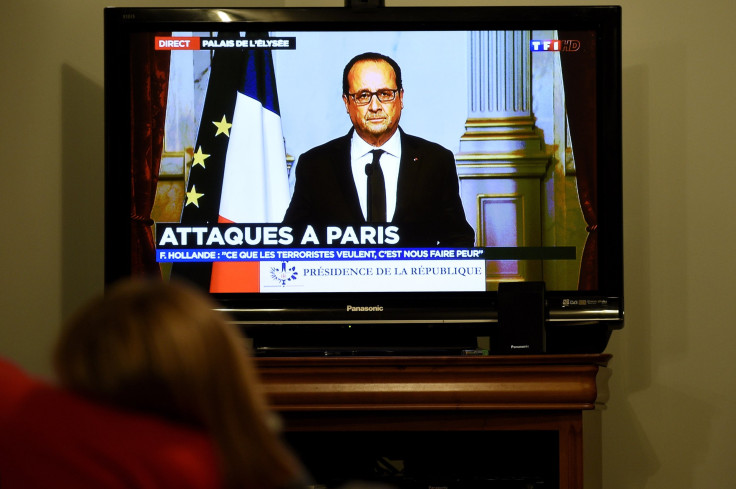Paris Terror Attacks Update: Hollande Closes French Borders; Increased Security Since The Charlie Hebdo Massacre

French President Francois Hollande declared a state of emergency and closed the country's borders Friday night in the wake of an apparent series of coordinated attacks at three locations that killed as many as 100 people and wounded scores of others. As many as 200 hostages were reportedly being held hostage at the Bataclan theater and witnesses nearby reported hearing gunshots and screams.
The government asked all citizens to stay in their homes, and law enforcement officials and military police flooded into the streets.
Paris had not yet recovered from the January massacre at Charlie Hebdo and a kosher market. After those attacks, the ministry of the interior and the ministry of defense established several new counterterrorism measures and revamped the country's anti-terror task force. France’s defense ministry put an emphasis on heightened surveillance of suspicious individuals, the International Business Times previously reported, and the government-run surveillance system dubbed the “Sentinelle” program reportedly hired hundreds more analysts and emphasized the aggressive monitoring of possible extremists. By some estimates, 1,000 fighters have traveled from France to Iraq and Syria since 2011, and it's not known how many radicalized fighters may have returned to France, and whether the security apparatus was aware of their movements.
“At the end of the day, no matter how much you improve, the nature of terrorism is that some individuals are able to slip through the cracks,” Frank Foley, a professor at King’s College in London who specializes in counter-terrorism, previously told the International Business Times.” Though a large-scale terrorist attack on par with 9/11 was unlikely to happen, he said, when it comes to frequent, small-scale attack attempts, “This is something that society will have to get used to.”
Hollande declaring "state of emergency" and closing of French borders
— katya adler (@BBCkatyaadler) November 13, 2015When the City of Lights boosted security after Charlie Hebdo was attacked, armed security guards were spotted all over Paris, patrolling densely populated areas such as the Marais and Montparnasse neighborhoods, the Eiffel Tower and Centre Pompidou. Patrons at shopping centers and museums throughout the city were also asked to open their bags for a quick security check, which had been a recent development stemming from the Hebdo massacre.
Among the highlighted revamped details this year was the GIGN, or the National Gendarmerie Intervention Group, which serves as a specialized task force within the French national police that is trained to respond to an emergency attack and hostage situations. While the group has existed since 1975, it was repurposed to focus more specifically on counterterrorism.
© Copyright IBTimes 2024. All rights reserved.





















